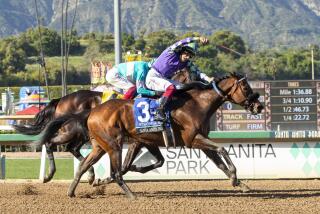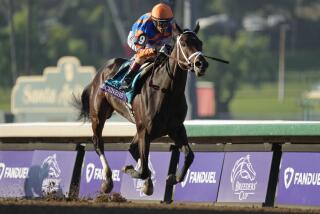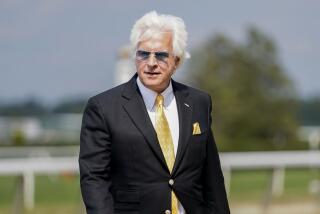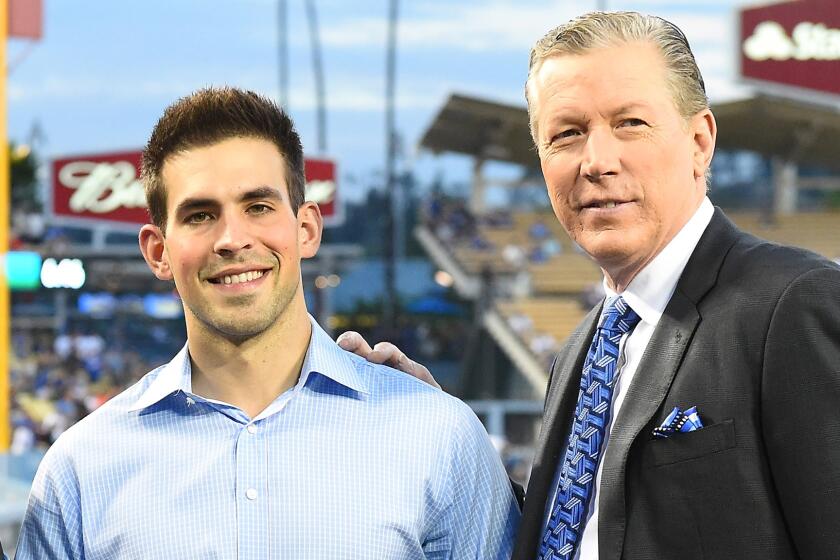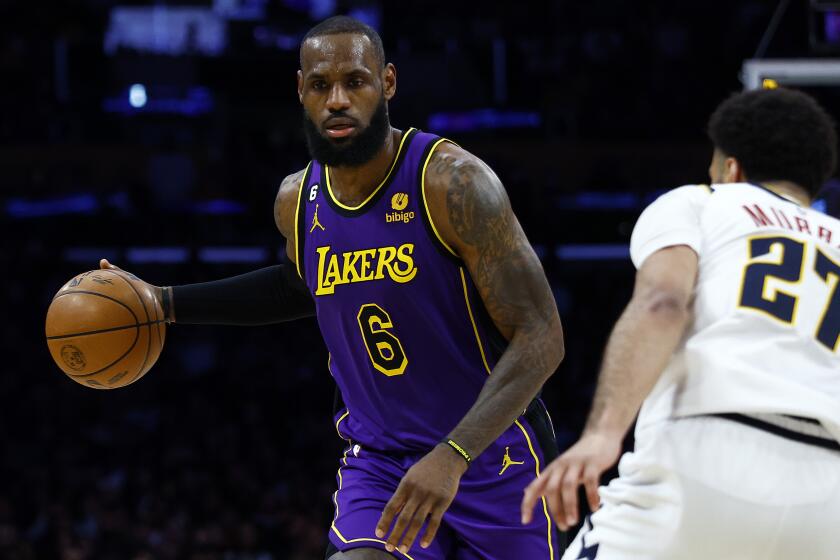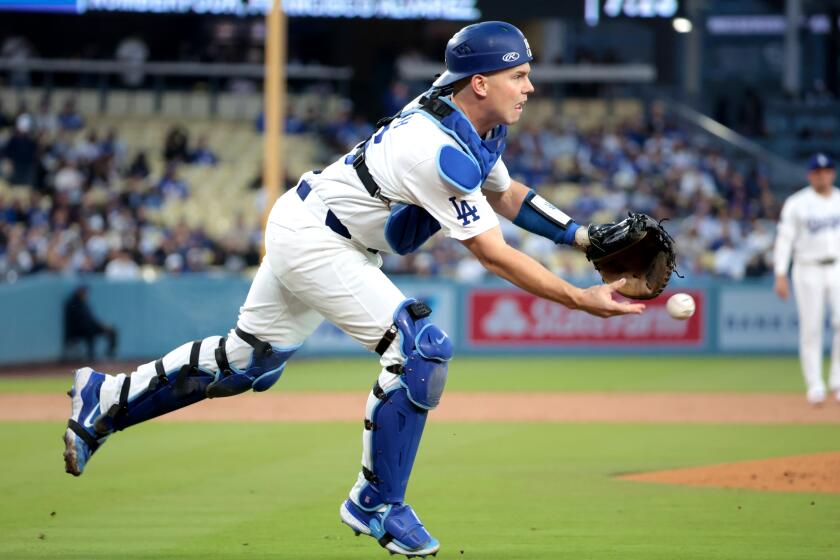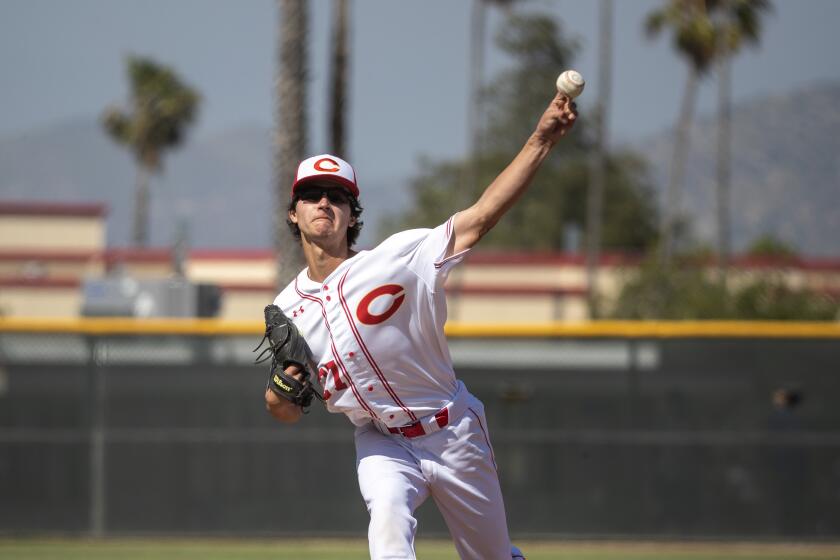Column: What’s the magic behind six Kentucky Derby winners? This horse caretaker from rural Mexico prepares horses for stardom
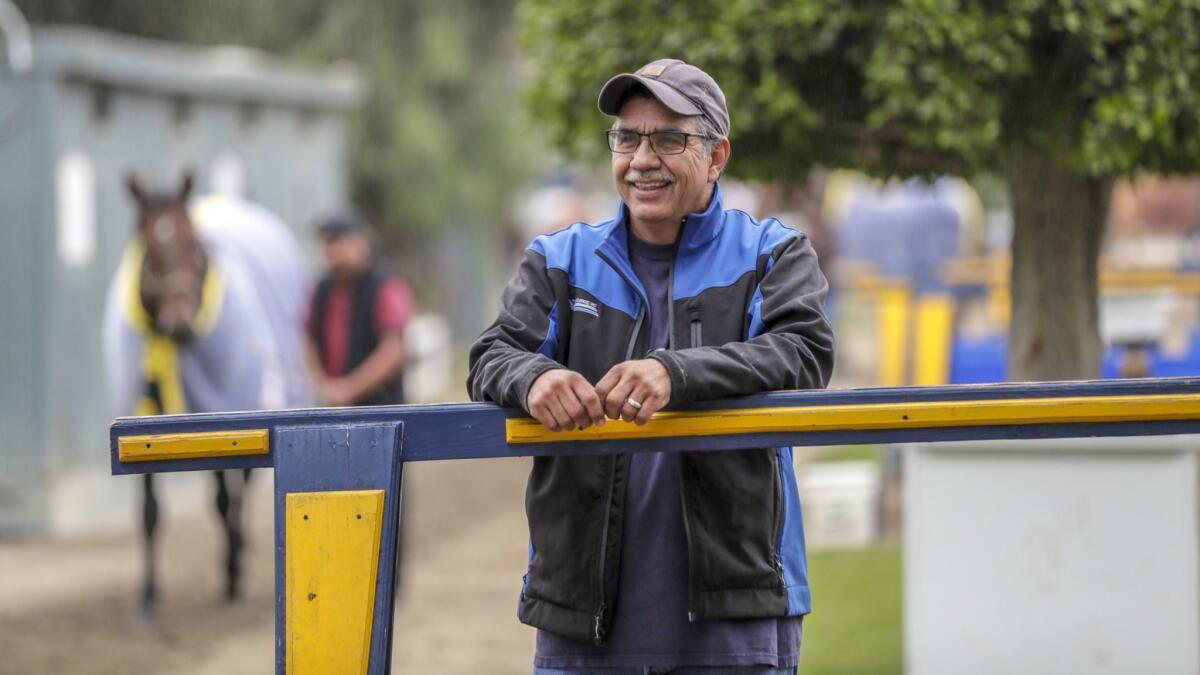
It’s just before 5 a.m. as cool light rain paints a mist across the darkened stables at Santa Anita Park.
Inside Barn 5, in a long corridor of swirling dust and bits of floating straw, horses have begun peeking from their stalls, their heads bobbing expectantly.
They’re waiting. He’s coming.
“Time to wake up!” says the Unknown Horseman, smiling underneath a baseball cap and rumpled jacket, his left hand clutching a giant Styrofoam cup of coffee.
As a soulful Spanish ballad flows from a smartphone propped on a bale of hay, Pascual Rivera begins walking through the barn on two bad knees, greeting his family. One by one, he stops at each horse’s small home, steps inside, hugs their necks and starts their day.
He pats Thirteen Squared on the head, she nuzzles his hand and licks his fingers as he whispers, “Hey, hey, hey,” into her ear.
“She’s a sweet one,” he says. “She loves to run.”
A few stalls down, Marley’s Freedom cradles her head into his arm and paws the straw. He smiles and, like any proud pop, he brags.
“She won her last two races,” he says, rubbing his nose against her face. “You’re a champion, aren’t you?”
After the initial greeting, Rivera steps inside each of their stalls and checks them. He looks into their feed tubs to make sure they ate breakfast. He leans down and picks up each leg to feel the joints for cuts or swelling. He holds each hoof to examine their shoes. Sometimes he even sticks his hand into their mouths to check their teeth, and they respond by slathering his knuckles with their giant tongues.
They let him do all this with rarely a kick or snort or twitch. He’s been making these rounds in this barn nearly every morning for 14 years. They know him.
“I love these horses, and maybe they can tell?” he says.
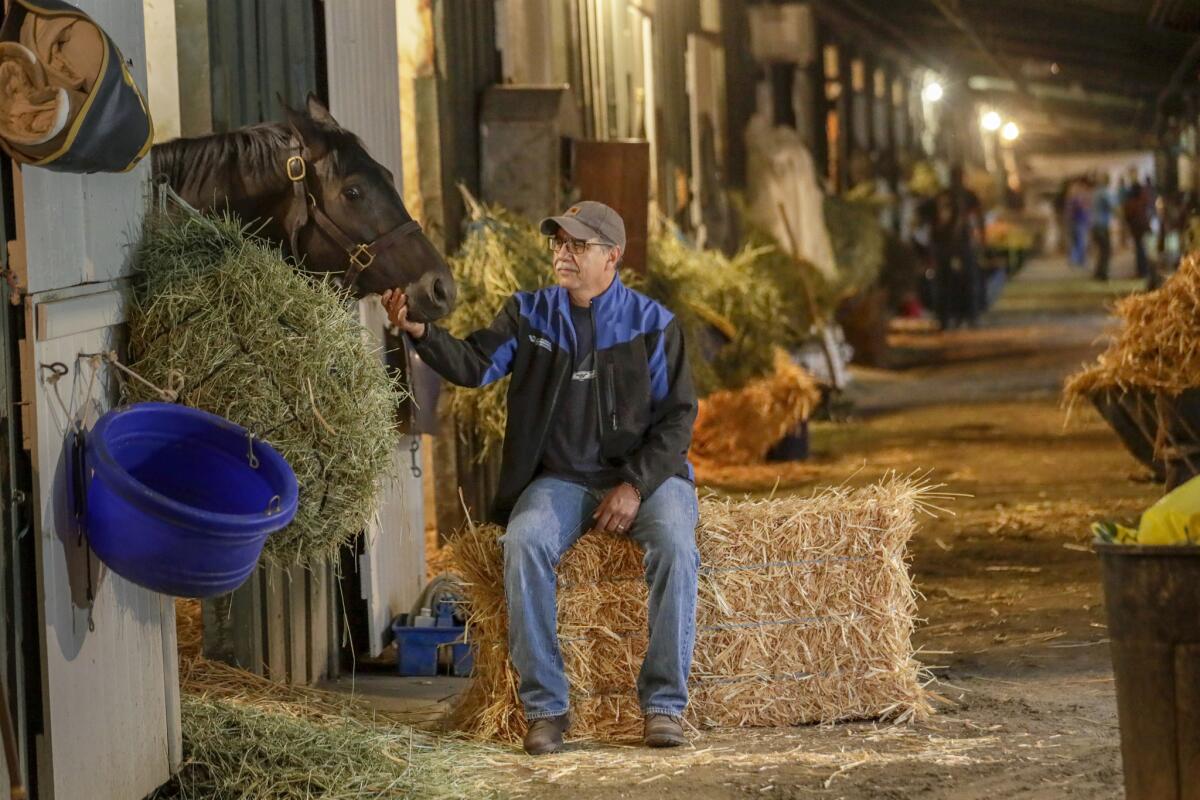
That’s what makes it so hard these days when he stops at vacant Stall 33, a room with an empty concrete floor surrounded by piles of bright straw. The name of the last occupant is scrawled in pen on a piece of masking tape outside the doorway. The story of the greatness of Pascual Rivera is actually not in the horses who are here, but the ones who are not.
“Justify” it reads.
This is the barn of legendary trainer Bob Baffert, and Justify is his dominant 3-year-old currently in Kentucky training for Saturday’s Belmont Stakes and a shot at the Triple Crown.
In that same stall once lived American Pharoah, who three years ago became the first Triple Crown winner in 37 years. Also residing in that stall has been Arrogate, the Breeders’ Cup Classic winner and top-ranked racehorse of 2016.
Rivera cared for all three, only to watch them depart for national glory while he stayed behind in Barn 5. He knows these great horses as well as anyone, yet has never been in their winner’s circle photos, never in the newspaper accounts, never even watched them race outside of Southern California.
As Baffert’s foreman, Rivera stays behind to run the 40-employee barn when Baffert and assistant trainer Jimmy Barnes are traveling with the stars. Like many anonymous backstretch workers throughout the racing world, Rivera handles great horses until they gallop into fame, at which point they literally leave him in the dust.
American Pharoah makes history, Rivera watches it from a tiny office TV. Justify is showered by the applause of thousands, Rivera ponders the quiet of an empty stall. There is no Champagne cooling here, only a tiny Magic Chef refrigerator filled with a big plastic bag of carrots.
“They go,” he says. “I stay.”
Yet he says it with a smile approximately the size of that Styrofoam cup. Rivera, 55, is grateful for the opportunity to continue a journey that began four decades ago on a farm in rural Mexico and continued on a winding path through restaurant kitchens and tack rooms and a hospital cancer ward.
It is a journey that every morning takes him home.
“Sometimes I wish I could be more part of all that big stuff,” the Unknown Horseman says. “But then I look around at these horses and I say, I am part of it.”
::
Bob Baffert shows up just after the first crow of a nearby rooster. It is almost 6:30 a.m. It is raining lightly, but Baffert’s shock of white hair remains perfectly in place.
“Hey, boss,” says Pascual.
“Tell me about the horses,” says Baffert.
Baffert, a Hall of Fame trainer who has saddled winners in 14 Triple Crown races, is the engaging and enduring face of horse racing.
Rivera has handled six Kentucky Derby winners in his 38-year career, yet his face is unknown, and, until now, his story has been untold.
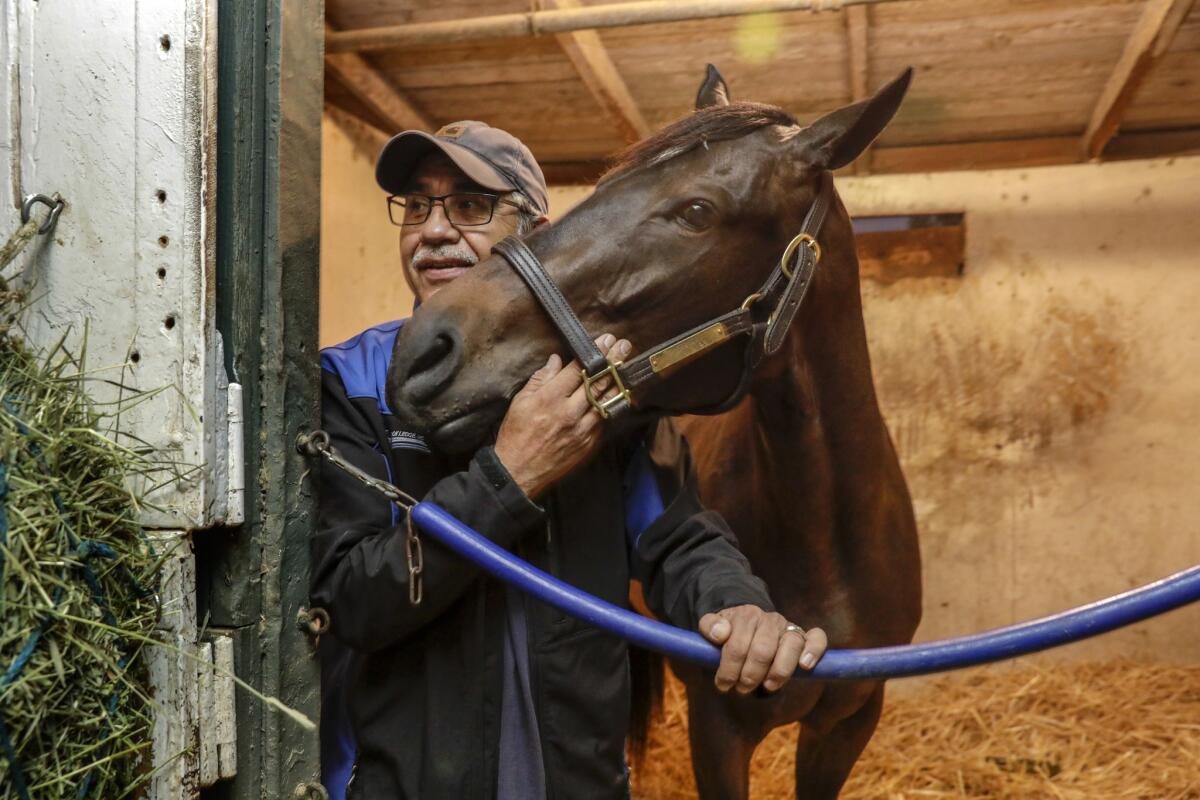
“He’s in charge of everything around here,”Baffert says. “He looks at every horse. He knows every horse. He loves these horses more than anything.”
Rivera has always loved the horses. He grew up riding on a ranch in the Mexican state of Durango before coming to the United States when he was 14. Once here, unable to attend high school because he had to make money for his family, he took a job washing dishes at Bob’s Big Boy in Arcadia. He was so desperate to work with horses that he would sleep for two hours in a Big Boy booth after his shift ended at 2 a.m., then wake up and walk more than a mile to Santa Anita to watch the horses train.
“Sometimes, you know, horses are easier than humans,” he says.
When he was 19, through a family connection, he was given a job at Santa Anita walking horses after workouts, then was promoted to the position of groom, charged with feeding the horses, cleaning the stalls and generally caring for the animals. For more than 10 years, he lived with other grooms in a tiny dorm-like tack room in the backstretch. He eventually married another backstretch worker, Aurora, and together they have raised three children in their Duarte home.
His one shining moment occurred in those early days when, while working for trainer D. Wayne Lukas, Rivera attended his only Kentucky Derby and shared in the success of the horse he was grooming, 1988 champion Winning Colors.
To arrive at that moment, he had to fly across country while standing up with the horse in the belly of the airplane.
“At least I got in the picture,” he says, tapping his phone and showing an aging photo of himself and the horse at the Churchill Downs winners circle.
When Lukas moved his operation out of Santa Anita, Rivera was hired by Baffert to a run a barn that can hold 55 thoroughbreds and a diverse crew of workers that mostly converses with him in Spanish while admiring how he can connect with the horses in any language.
“The horses can feel it in you,” longtime exercise rider Manny Avila says. “They feel it in Pascual.”
Sometimes there are miscommunications. About 20 years ago, Tactical Cat broke Rivera’s left knee cap with a swift kick, sidelining him for several months. Then there was the time he stepped into a rut while walking Capital Account and tore up his other knee. He has been bitten on his arms and hands, yet nothing was as painful as when a notable horse forced him to cut himself.
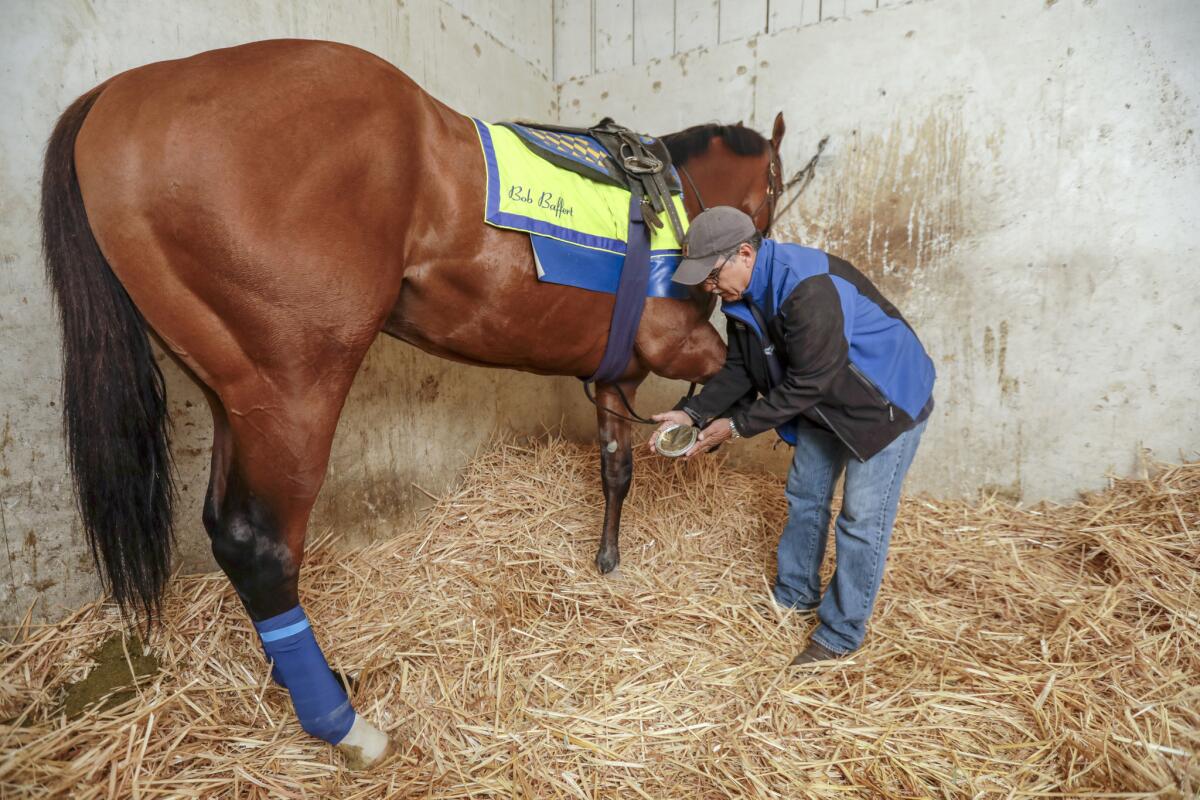
It occurred moments after this year’s Santa Anita Derby and the horse was Justify. As Rivera was cutting off the winner’s bandages, Justify, who had not yet calmed down, kicked him and he cut himself with the blade. While the victory was being celebrated, Rivera was being treated at the backstretch medical clinic.
“I missed all the excitement again,” he says.
Rivera lives through a different kind of excitement. Once, long ago, he slept outside a stall — covered in straw — because a trainer was concerned that an opposing trainer was going to drug his horse. Other times he has been called to the track in the middle of the night to help treat a horse suffering from colic. He has even ridden in a trailer with a badly injured horse on its way to be euthanized.
“I’ll never forget the look in its eyes,” he says.
A couple of years ago, it was the horses who comforted him after he underwent surgery for prostate cancer. Rivera rushed back to work, to horses that didn’t look at him any differently, to a job that he says brought him back to health.
“Here, you can’t think of anything but the horses,” he says.
He recently made one of those after-hours trips for a different reason. He climbed out of bed to load a horse on to a trailer in the middle of the night in preparation for a flight to stardom.
The horse was Justify. The Unknown Horseman hugged him hard, whispered him best wishes, then disappeared back into the barn, past that penned scrawl on the masking tape.
“He’ll be back,” Rivera says. “I’ll see him then.”
Get more of Bill Plaschke’s work and follow him on Twitter @BillPlaschke
More to Read
Get our high school sports newsletter
Prep Rally is devoted to the SoCal high school sports experience, bringing you scores, stories and a behind-the-scenes look at what makes prep sports so popular.
You may occasionally receive promotional content from the Los Angeles Times.

